Tapping Chinese Markets for UHT Milk
VerifiedAdded on 2023/01/11
|16
|4728
|60
AI Summary
This project report explores the factors to consider when tapping the Chinese markets for UHT milk. It covers trade barriers, social and ethical issues, cultural preferences, and expansion methods for internationalization.
Contribute Materials
Your contribution can guide someone’s learning journey. Share your
documents today.
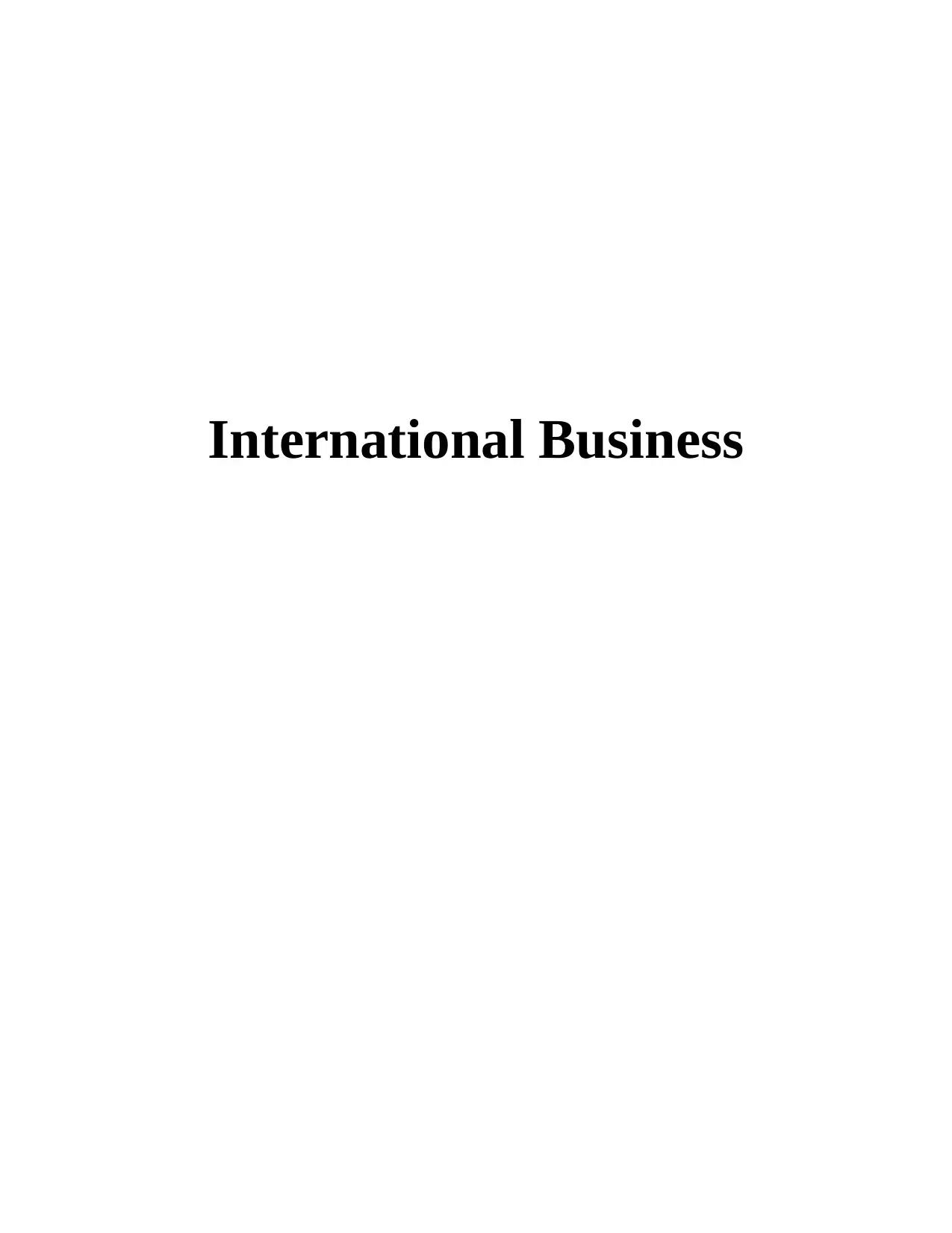
International Business
Secure Best Marks with AI Grader
Need help grading? Try our AI Grader for instant feedback on your assignments.
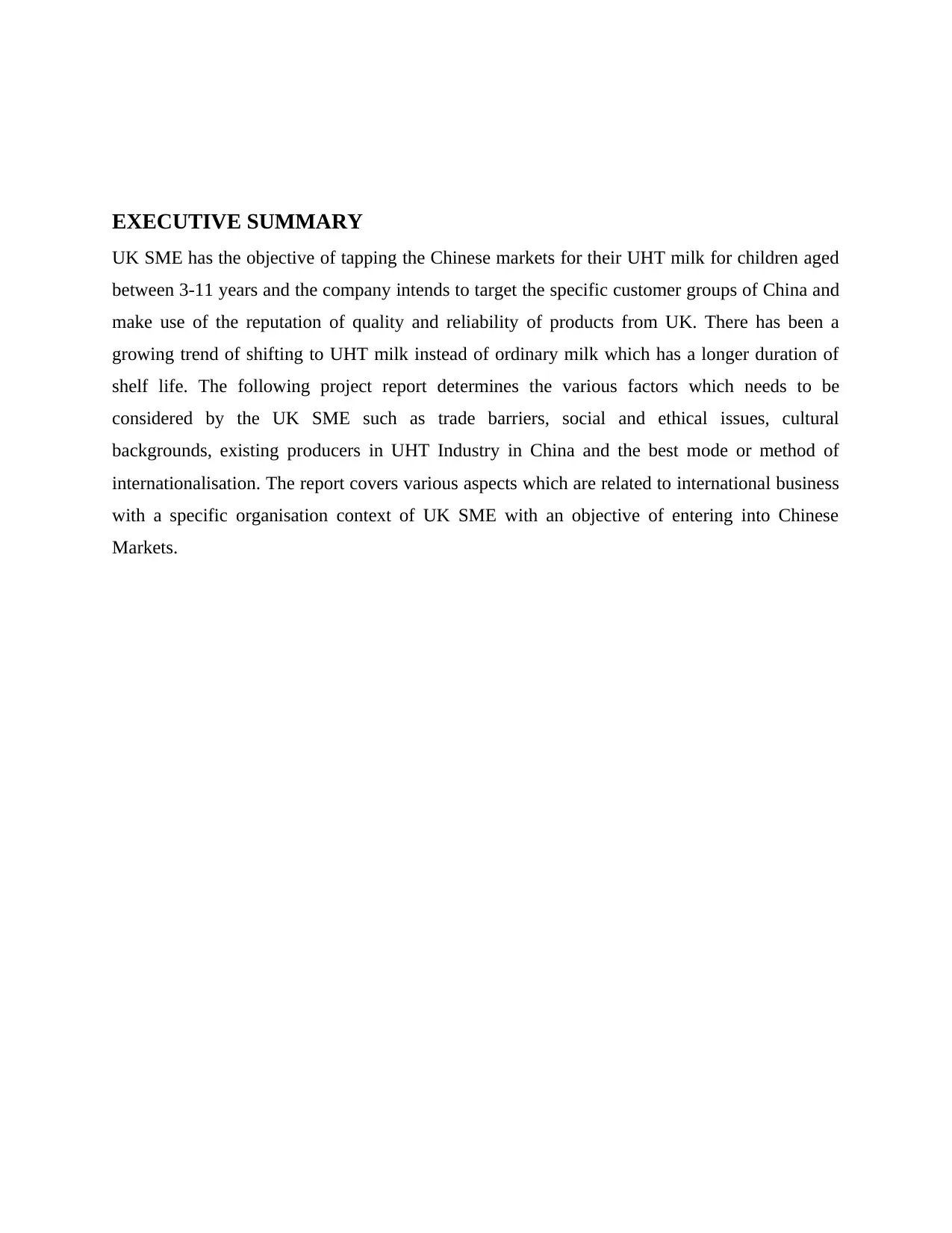
EXECUTIVE SUMMARY
UK SME has the objective of tapping the Chinese markets for their UHT milk for children aged
between 3-11 years and the company intends to target the specific customer groups of China and
make use of the reputation of quality and reliability of products from UK. There has been a
growing trend of shifting to UHT milk instead of ordinary milk which has a longer duration of
shelf life. The following project report determines the various factors which needs to be
considered by the UK SME such as trade barriers, social and ethical issues, cultural
backgrounds, existing producers in UHT Industry in China and the best mode or method of
internationalisation. The report covers various aspects which are related to international business
with a specific organisation context of UK SME with an objective of entering into Chinese
Markets.
UK SME has the objective of tapping the Chinese markets for their UHT milk for children aged
between 3-11 years and the company intends to target the specific customer groups of China and
make use of the reputation of quality and reliability of products from UK. There has been a
growing trend of shifting to UHT milk instead of ordinary milk which has a longer duration of
shelf life. The following project report determines the various factors which needs to be
considered by the UK SME such as trade barriers, social and ethical issues, cultural
backgrounds, existing producers in UHT Industry in China and the best mode or method of
internationalisation. The report covers various aspects which are related to international business
with a specific organisation context of UK SME with an objective of entering into Chinese
Markets.
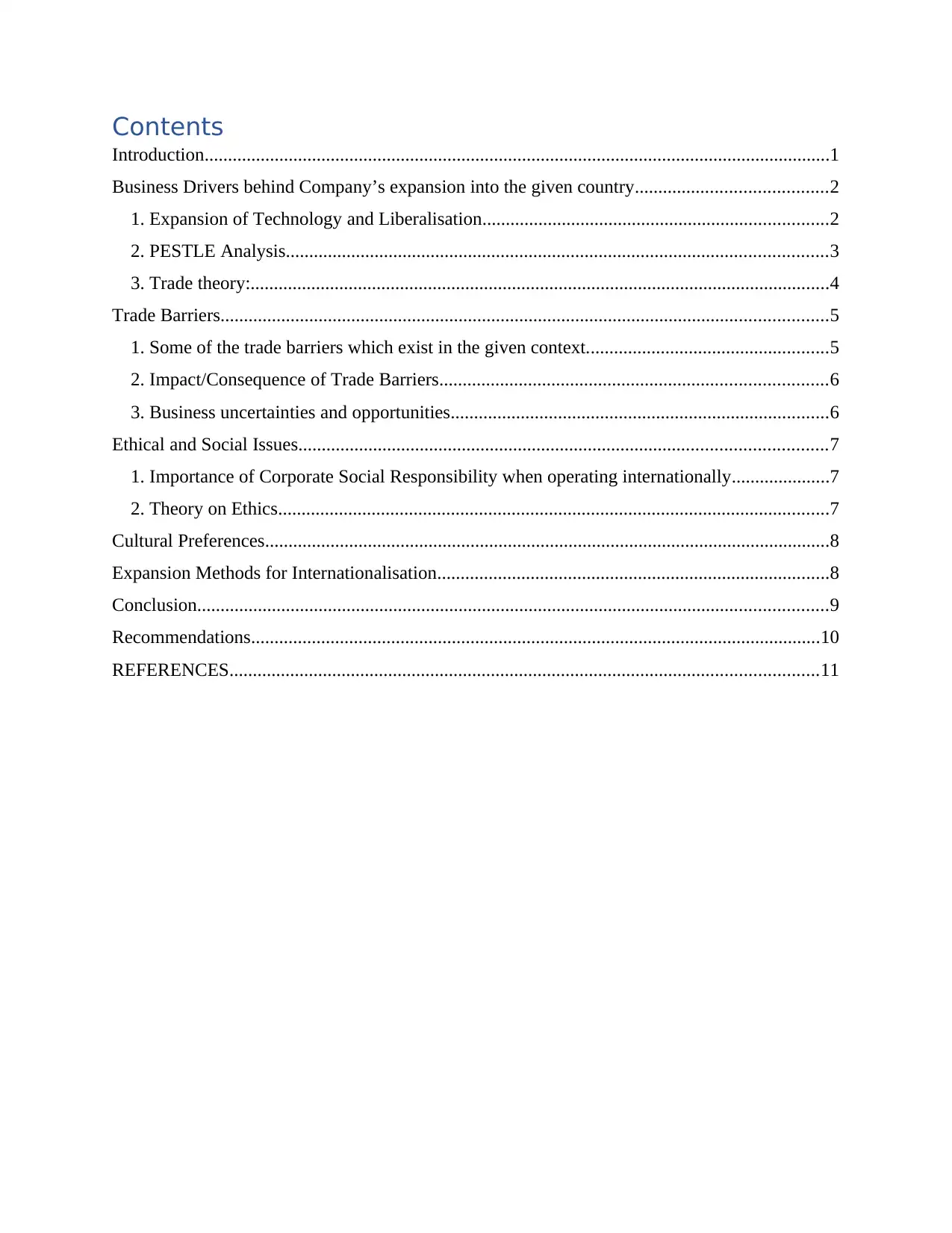
Contents
Introduction......................................................................................................................................1
Business Drivers behind Company’s expansion into the given country.........................................2
1. Expansion of Technology and Liberalisation..........................................................................2
2. PESTLE Analysis....................................................................................................................3
3. Trade theory:............................................................................................................................4
Trade Barriers..................................................................................................................................5
1. Some of the trade barriers which exist in the given context....................................................5
2. Impact/Consequence of Trade Barriers...................................................................................6
3. Business uncertainties and opportunities.................................................................................6
Ethical and Social Issues.................................................................................................................7
1. Importance of Corporate Social Responsibility when operating internationally.....................7
2. Theory on Ethics......................................................................................................................7
Cultural Preferences.........................................................................................................................8
Expansion Methods for Internationalisation....................................................................................8
Conclusion.......................................................................................................................................9
Recommendations..........................................................................................................................10
REFERENCES..............................................................................................................................11
Introduction......................................................................................................................................1
Business Drivers behind Company’s expansion into the given country.........................................2
1. Expansion of Technology and Liberalisation..........................................................................2
2. PESTLE Analysis....................................................................................................................3
3. Trade theory:............................................................................................................................4
Trade Barriers..................................................................................................................................5
1. Some of the trade barriers which exist in the given context....................................................5
2. Impact/Consequence of Trade Barriers...................................................................................6
3. Business uncertainties and opportunities.................................................................................6
Ethical and Social Issues.................................................................................................................7
1. Importance of Corporate Social Responsibility when operating internationally.....................7
2. Theory on Ethics......................................................................................................................7
Cultural Preferences.........................................................................................................................8
Expansion Methods for Internationalisation....................................................................................8
Conclusion.......................................................................................................................................9
Recommendations..........................................................................................................................10
REFERENCES..............................................................................................................................11

Secure Best Marks with AI Grader
Need help grading? Try our AI Grader for instant feedback on your assignments.
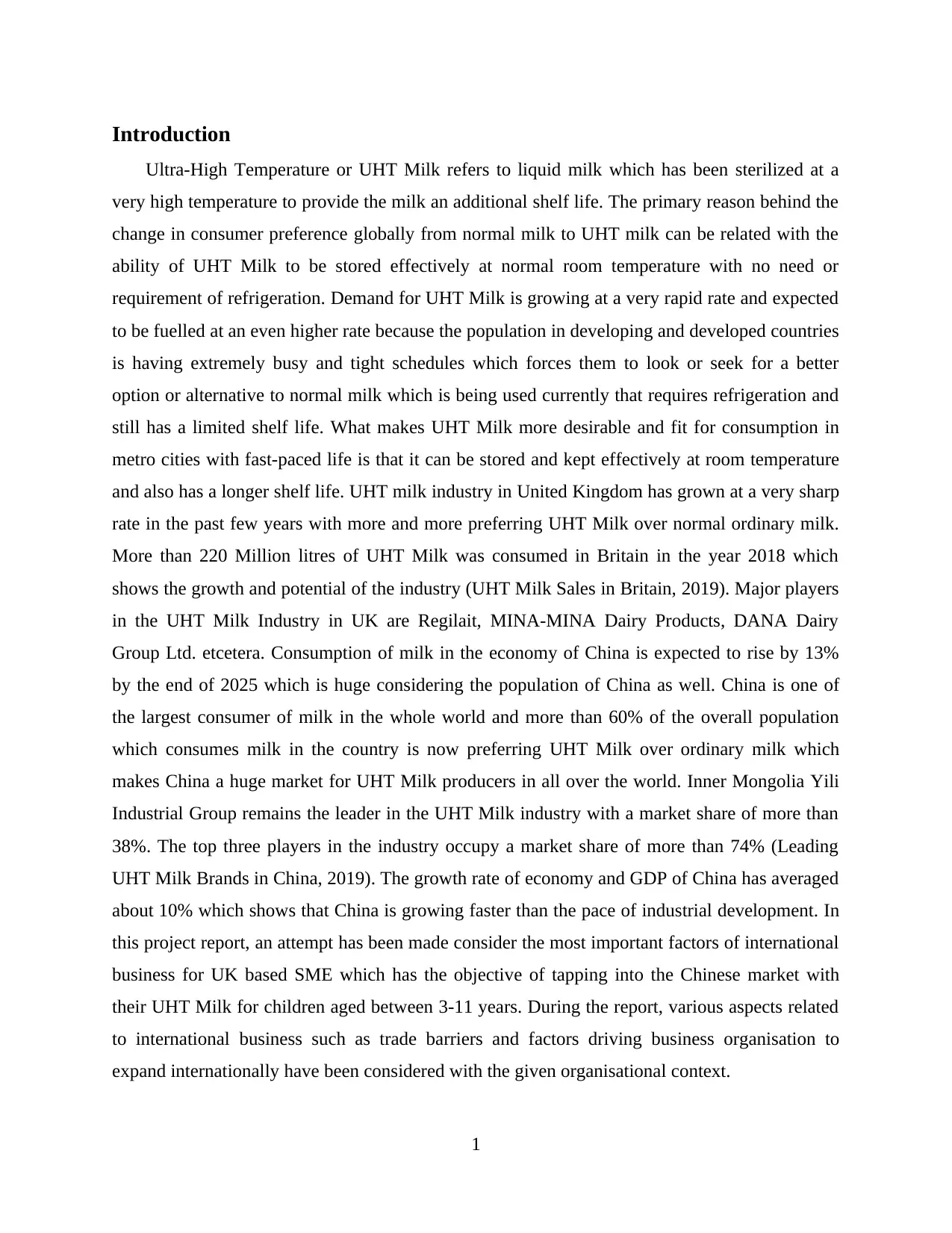
Introduction
Ultra-High Temperature or UHT Milk refers to liquid milk which has been sterilized at a
very high temperature to provide the milk an additional shelf life. The primary reason behind the
change in consumer preference globally from normal milk to UHT milk can be related with the
ability of UHT Milk to be stored effectively at normal room temperature with no need or
requirement of refrigeration. Demand for UHT Milk is growing at a very rapid rate and expected
to be fuelled at an even higher rate because the population in developing and developed countries
is having extremely busy and tight schedules which forces them to look or seek for a better
option or alternative to normal milk which is being used currently that requires refrigeration and
still has a limited shelf life. What makes UHT Milk more desirable and fit for consumption in
metro cities with fast-paced life is that it can be stored and kept effectively at room temperature
and also has a longer shelf life. UHT milk industry in United Kingdom has grown at a very sharp
rate in the past few years with more and more preferring UHT Milk over normal ordinary milk.
More than 220 Million litres of UHT Milk was consumed in Britain in the year 2018 which
shows the growth and potential of the industry (UHT Milk Sales in Britain, 2019). Major players
in the UHT Milk Industry in UK are Regilait, MINA-MINA Dairy Products, DANA Dairy
Group Ltd. etcetera. Consumption of milk in the economy of China is expected to rise by 13%
by the end of 2025 which is huge considering the population of China as well. China is one of
the largest consumer of milk in the whole world and more than 60% of the overall population
which consumes milk in the country is now preferring UHT Milk over ordinary milk which
makes China a huge market for UHT Milk producers in all over the world. Inner Mongolia Yili
Industrial Group remains the leader in the UHT Milk industry with a market share of more than
38%. The top three players in the industry occupy a market share of more than 74% (Leading
UHT Milk Brands in China, 2019). The growth rate of economy and GDP of China has averaged
about 10% which shows that China is growing faster than the pace of industrial development. In
this project report, an attempt has been made consider the most important factors of international
business for UK based SME which has the objective of tapping into the Chinese market with
their UHT Milk for children aged between 3-11 years. During the report, various aspects related
to international business such as trade barriers and factors driving business organisation to
expand internationally have been considered with the given organisational context.
1
Ultra-High Temperature or UHT Milk refers to liquid milk which has been sterilized at a
very high temperature to provide the milk an additional shelf life. The primary reason behind the
change in consumer preference globally from normal milk to UHT milk can be related with the
ability of UHT Milk to be stored effectively at normal room temperature with no need or
requirement of refrigeration. Demand for UHT Milk is growing at a very rapid rate and expected
to be fuelled at an even higher rate because the population in developing and developed countries
is having extremely busy and tight schedules which forces them to look or seek for a better
option or alternative to normal milk which is being used currently that requires refrigeration and
still has a limited shelf life. What makes UHT Milk more desirable and fit for consumption in
metro cities with fast-paced life is that it can be stored and kept effectively at room temperature
and also has a longer shelf life. UHT milk industry in United Kingdom has grown at a very sharp
rate in the past few years with more and more preferring UHT Milk over normal ordinary milk.
More than 220 Million litres of UHT Milk was consumed in Britain in the year 2018 which
shows the growth and potential of the industry (UHT Milk Sales in Britain, 2019). Major players
in the UHT Milk Industry in UK are Regilait, MINA-MINA Dairy Products, DANA Dairy
Group Ltd. etcetera. Consumption of milk in the economy of China is expected to rise by 13%
by the end of 2025 which is huge considering the population of China as well. China is one of
the largest consumer of milk in the whole world and more than 60% of the overall population
which consumes milk in the country is now preferring UHT Milk over ordinary milk which
makes China a huge market for UHT Milk producers in all over the world. Inner Mongolia Yili
Industrial Group remains the leader in the UHT Milk industry with a market share of more than
38%. The top three players in the industry occupy a market share of more than 74% (Leading
UHT Milk Brands in China, 2019). The growth rate of economy and GDP of China has averaged
about 10% which shows that China is growing faster than the pace of industrial development. In
this project report, an attempt has been made consider the most important factors of international
business for UK based SME which has the objective of tapping into the Chinese market with
their UHT Milk for children aged between 3-11 years. During the report, various aspects related
to international business such as trade barriers and factors driving business organisation to
expand internationally have been considered with the given organisational context.
1
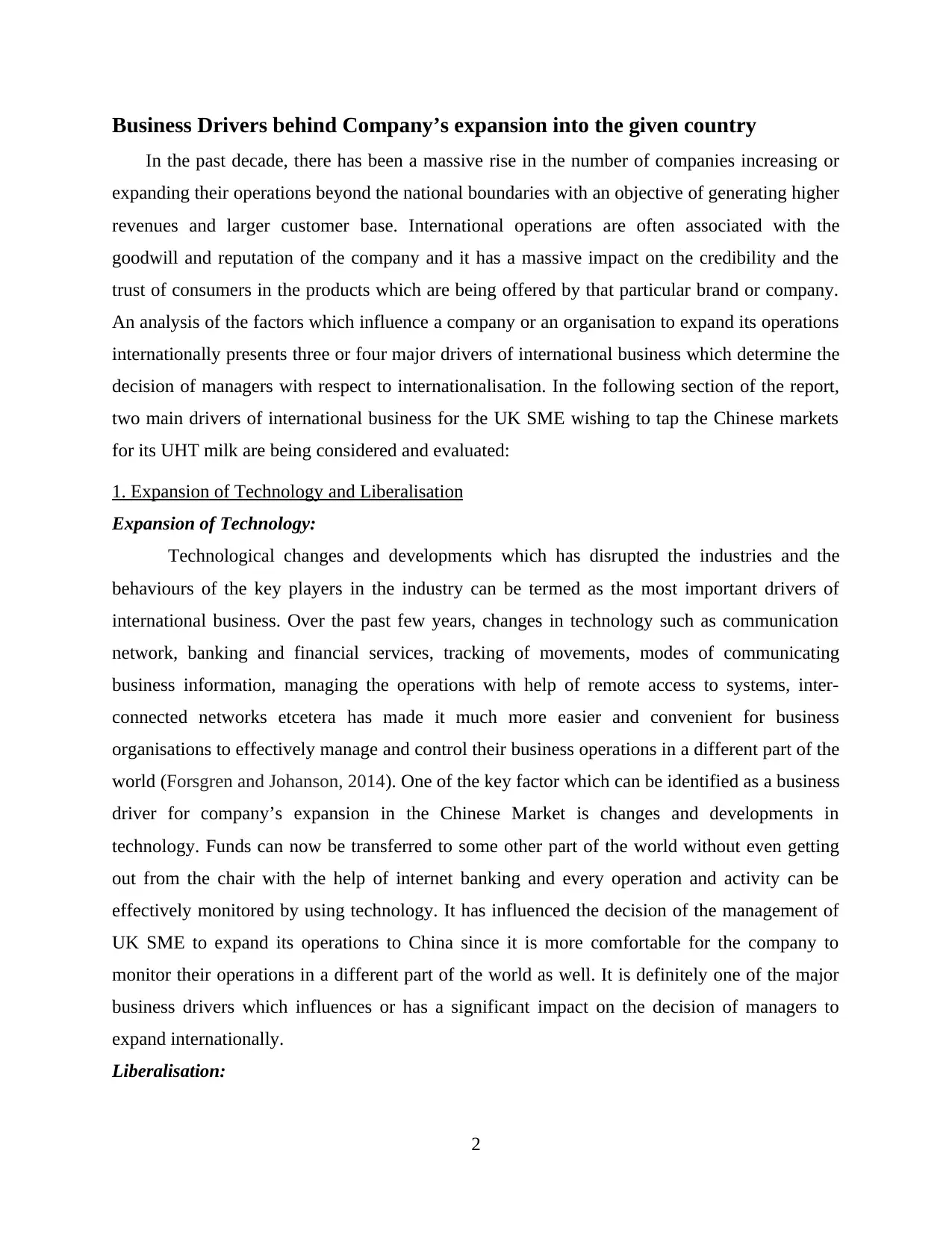
Business Drivers behind Company’s expansion into the given country
In the past decade, there has been a massive rise in the number of companies increasing or
expanding their operations beyond the national boundaries with an objective of generating higher
revenues and larger customer base. International operations are often associated with the
goodwill and reputation of the company and it has a massive impact on the credibility and the
trust of consumers in the products which are being offered by that particular brand or company.
An analysis of the factors which influence a company or an organisation to expand its operations
internationally presents three or four major drivers of international business which determine the
decision of managers with respect to internationalisation. In the following section of the report,
two main drivers of international business for the UK SME wishing to tap the Chinese markets
for its UHT milk are being considered and evaluated:
1. Expansion of Technology and Liberalisation
Expansion of Technology:
Technological changes and developments which has disrupted the industries and the
behaviours of the key players in the industry can be termed as the most important drivers of
international business. Over the past few years, changes in technology such as communication
network, banking and financial services, tracking of movements, modes of communicating
business information, managing the operations with help of remote access to systems, inter-
connected networks etcetera has made it much more easier and convenient for business
organisations to effectively manage and control their business operations in a different part of the
world (Forsgren and Johanson, 2014). One of the key factor which can be identified as a business
driver for company’s expansion in the Chinese Market is changes and developments in
technology. Funds can now be transferred to some other part of the world without even getting
out from the chair with the help of internet banking and every operation and activity can be
effectively monitored by using technology. It has influenced the decision of the management of
UK SME to expand its operations to China since it is more comfortable for the company to
monitor their operations in a different part of the world as well. It is definitely one of the major
business drivers which influences or has a significant impact on the decision of managers to
expand internationally.
Liberalisation:
2
In the past decade, there has been a massive rise in the number of companies increasing or
expanding their operations beyond the national boundaries with an objective of generating higher
revenues and larger customer base. International operations are often associated with the
goodwill and reputation of the company and it has a massive impact on the credibility and the
trust of consumers in the products which are being offered by that particular brand or company.
An analysis of the factors which influence a company or an organisation to expand its operations
internationally presents three or four major drivers of international business which determine the
decision of managers with respect to internationalisation. In the following section of the report,
two main drivers of international business for the UK SME wishing to tap the Chinese markets
for its UHT milk are being considered and evaluated:
1. Expansion of Technology and Liberalisation
Expansion of Technology:
Technological changes and developments which has disrupted the industries and the
behaviours of the key players in the industry can be termed as the most important drivers of
international business. Over the past few years, changes in technology such as communication
network, banking and financial services, tracking of movements, modes of communicating
business information, managing the operations with help of remote access to systems, inter-
connected networks etcetera has made it much more easier and convenient for business
organisations to effectively manage and control their business operations in a different part of the
world (Forsgren and Johanson, 2014). One of the key factor which can be identified as a business
driver for company’s expansion in the Chinese Market is changes and developments in
technology. Funds can now be transferred to some other part of the world without even getting
out from the chair with the help of internet banking and every operation and activity can be
effectively monitored by using technology. It has influenced the decision of the management of
UK SME to expand its operations to China since it is more comfortable for the company to
monitor their operations in a different part of the world as well. It is definitely one of the major
business drivers which influences or has a significant impact on the decision of managers to
expand internationally.
Liberalisation:
2
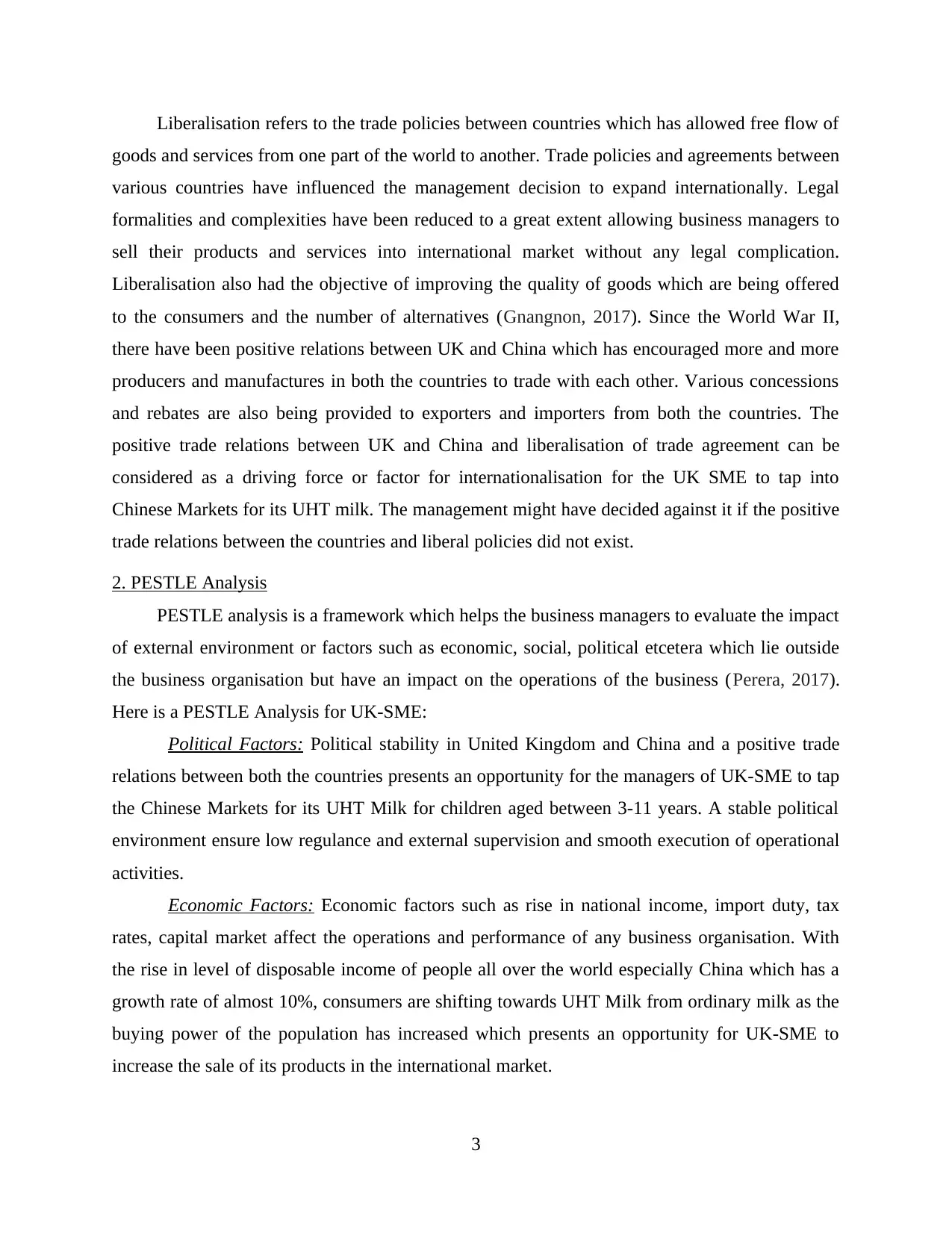
Liberalisation refers to the trade policies between countries which has allowed free flow of
goods and services from one part of the world to another. Trade policies and agreements between
various countries have influenced the management decision to expand internationally. Legal
formalities and complexities have been reduced to a great extent allowing business managers to
sell their products and services into international market without any legal complication.
Liberalisation also had the objective of improving the quality of goods which are being offered
to the consumers and the number of alternatives (Gnangnon, 2017). Since the World War II,
there have been positive relations between UK and China which has encouraged more and more
producers and manufactures in both the countries to trade with each other. Various concessions
and rebates are also being provided to exporters and importers from both the countries. The
positive trade relations between UK and China and liberalisation of trade agreement can be
considered as a driving force or factor for internationalisation for the UK SME to tap into
Chinese Markets for its UHT milk. The management might have decided against it if the positive
trade relations between the countries and liberal policies did not exist.
2. PESTLE Analysis
PESTLE analysis is a framework which helps the business managers to evaluate the impact
of external environment or factors such as economic, social, political etcetera which lie outside
the business organisation but have an impact on the operations of the business (Perera, 2017).
Here is a PESTLE Analysis for UK-SME:
Political Factors: Political stability in United Kingdom and China and a positive trade
relations between both the countries presents an opportunity for the managers of UK-SME to tap
the Chinese Markets for its UHT Milk for children aged between 3-11 years. A stable political
environment ensure low regulance and external supervision and smooth execution of operational
activities.
Economic Factors: Economic factors such as rise in national income, import duty, tax
rates, capital market affect the operations and performance of any business organisation. With
the rise in level of disposable income of people all over the world especially China which has a
growth rate of almost 10%, consumers are shifting towards UHT Milk from ordinary milk as the
buying power of the population has increased which presents an opportunity for UK-SME to
increase the sale of its products in the international market.
3
goods and services from one part of the world to another. Trade policies and agreements between
various countries have influenced the management decision to expand internationally. Legal
formalities and complexities have been reduced to a great extent allowing business managers to
sell their products and services into international market without any legal complication.
Liberalisation also had the objective of improving the quality of goods which are being offered
to the consumers and the number of alternatives (Gnangnon, 2017). Since the World War II,
there have been positive relations between UK and China which has encouraged more and more
producers and manufactures in both the countries to trade with each other. Various concessions
and rebates are also being provided to exporters and importers from both the countries. The
positive trade relations between UK and China and liberalisation of trade agreement can be
considered as a driving force or factor for internationalisation for the UK SME to tap into
Chinese Markets for its UHT milk. The management might have decided against it if the positive
trade relations between the countries and liberal policies did not exist.
2. PESTLE Analysis
PESTLE analysis is a framework which helps the business managers to evaluate the impact
of external environment or factors such as economic, social, political etcetera which lie outside
the business organisation but have an impact on the operations of the business (Perera, 2017).
Here is a PESTLE Analysis for UK-SME:
Political Factors: Political stability in United Kingdom and China and a positive trade
relations between both the countries presents an opportunity for the managers of UK-SME to tap
the Chinese Markets for its UHT Milk for children aged between 3-11 years. A stable political
environment ensure low regulance and external supervision and smooth execution of operational
activities.
Economic Factors: Economic factors such as rise in national income, import duty, tax
rates, capital market affect the operations and performance of any business organisation. With
the rise in level of disposable income of people all over the world especially China which has a
growth rate of almost 10%, consumers are shifting towards UHT Milk from ordinary milk as the
buying power of the population has increased which presents an opportunity for UK-SME to
increase the sale of its products in the international market.
3
Paraphrase This Document
Need a fresh take? Get an instant paraphrase of this document with our AI Paraphraser
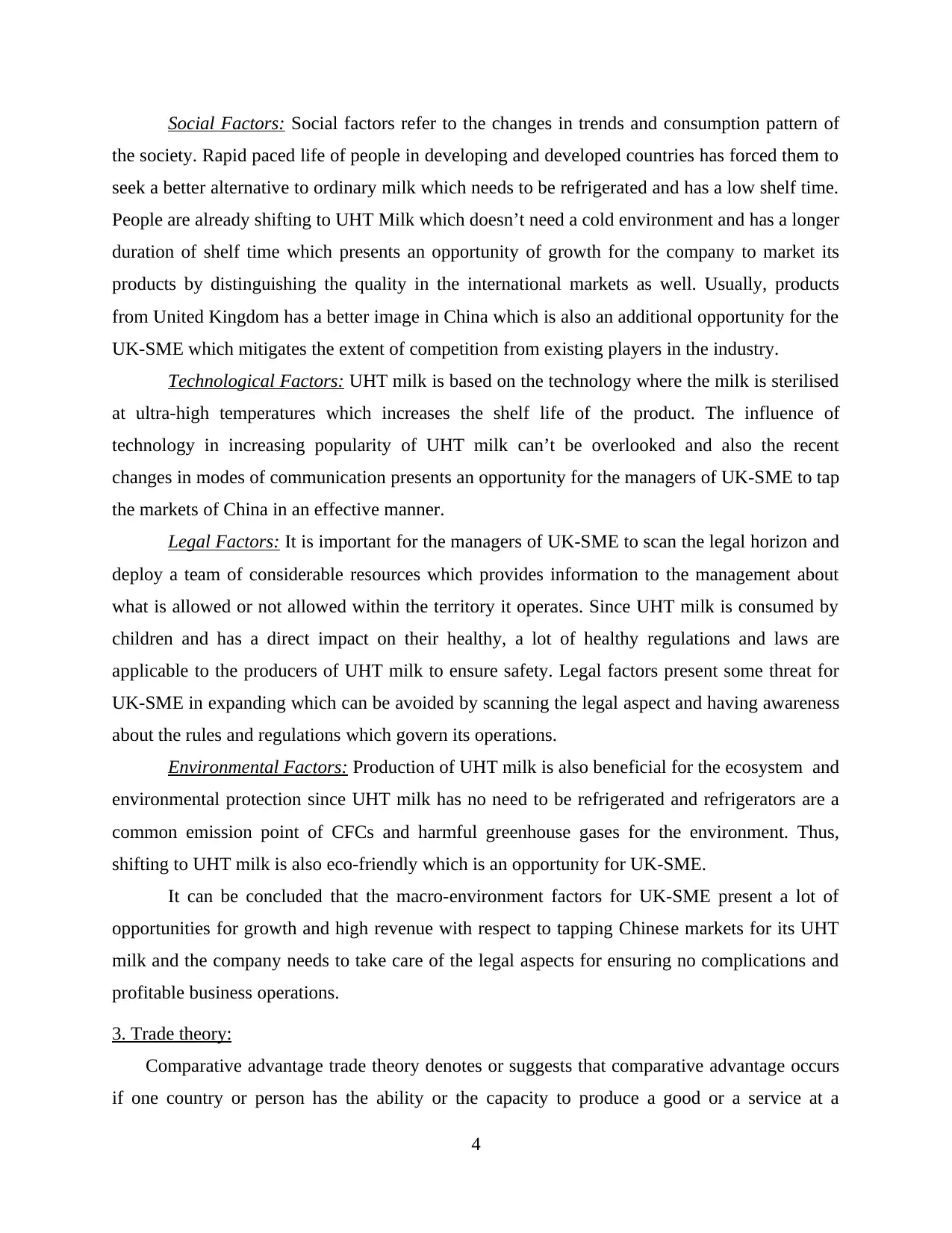
Social Factors: Social factors refer to the changes in trends and consumption pattern of
the society. Rapid paced life of people in developing and developed countries has forced them to
seek a better alternative to ordinary milk which needs to be refrigerated and has a low shelf time.
People are already shifting to UHT Milk which doesn’t need a cold environment and has a longer
duration of shelf time which presents an opportunity of growth for the company to market its
products by distinguishing the quality in the international markets as well. Usually, products
from United Kingdom has a better image in China which is also an additional opportunity for the
UK-SME which mitigates the extent of competition from existing players in the industry.
Technological Factors: UHT milk is based on the technology where the milk is sterilised
at ultra-high temperatures which increases the shelf life of the product. The influence of
technology in increasing popularity of UHT milk can’t be overlooked and also the recent
changes in modes of communication presents an opportunity for the managers of UK-SME to tap
the markets of China in an effective manner.
Legal Factors: It is important for the managers of UK-SME to scan the legal horizon and
deploy a team of considerable resources which provides information to the management about
what is allowed or not allowed within the territory it operates. Since UHT milk is consumed by
children and has a direct impact on their healthy, a lot of healthy regulations and laws are
applicable to the producers of UHT milk to ensure safety. Legal factors present some threat for
UK-SME in expanding which can be avoided by scanning the legal aspect and having awareness
about the rules and regulations which govern its operations.
Environmental Factors: Production of UHT milk is also beneficial for the ecosystem and
environmental protection since UHT milk has no need to be refrigerated and refrigerators are a
common emission point of CFCs and harmful greenhouse gases for the environment. Thus,
shifting to UHT milk is also eco-friendly which is an opportunity for UK-SME.
It can be concluded that the macro-environment factors for UK-SME present a lot of
opportunities for growth and high revenue with respect to tapping Chinese markets for its UHT
milk and the company needs to take care of the legal aspects for ensuring no complications and
profitable business operations.
3. Trade theory:
Comparative advantage trade theory denotes or suggests that comparative advantage occurs
if one country or person has the ability or the capacity to produce a good or a service at a
4
the society. Rapid paced life of people in developing and developed countries has forced them to
seek a better alternative to ordinary milk which needs to be refrigerated and has a low shelf time.
People are already shifting to UHT Milk which doesn’t need a cold environment and has a longer
duration of shelf time which presents an opportunity of growth for the company to market its
products by distinguishing the quality in the international markets as well. Usually, products
from United Kingdom has a better image in China which is also an additional opportunity for the
UK-SME which mitigates the extent of competition from existing players in the industry.
Technological Factors: UHT milk is based on the technology where the milk is sterilised
at ultra-high temperatures which increases the shelf life of the product. The influence of
technology in increasing popularity of UHT milk can’t be overlooked and also the recent
changes in modes of communication presents an opportunity for the managers of UK-SME to tap
the markets of China in an effective manner.
Legal Factors: It is important for the managers of UK-SME to scan the legal horizon and
deploy a team of considerable resources which provides information to the management about
what is allowed or not allowed within the territory it operates. Since UHT milk is consumed by
children and has a direct impact on their healthy, a lot of healthy regulations and laws are
applicable to the producers of UHT milk to ensure safety. Legal factors present some threat for
UK-SME in expanding which can be avoided by scanning the legal aspect and having awareness
about the rules and regulations which govern its operations.
Environmental Factors: Production of UHT milk is also beneficial for the ecosystem and
environmental protection since UHT milk has no need to be refrigerated and refrigerators are a
common emission point of CFCs and harmful greenhouse gases for the environment. Thus,
shifting to UHT milk is also eco-friendly which is an opportunity for UK-SME.
It can be concluded that the macro-environment factors for UK-SME present a lot of
opportunities for growth and high revenue with respect to tapping Chinese markets for its UHT
milk and the company needs to take care of the legal aspects for ensuring no complications and
profitable business operations.
3. Trade theory:
Comparative advantage trade theory denotes or suggests that comparative advantage occurs
if one country or person has the ability or the capacity to produce a good or a service at a
4
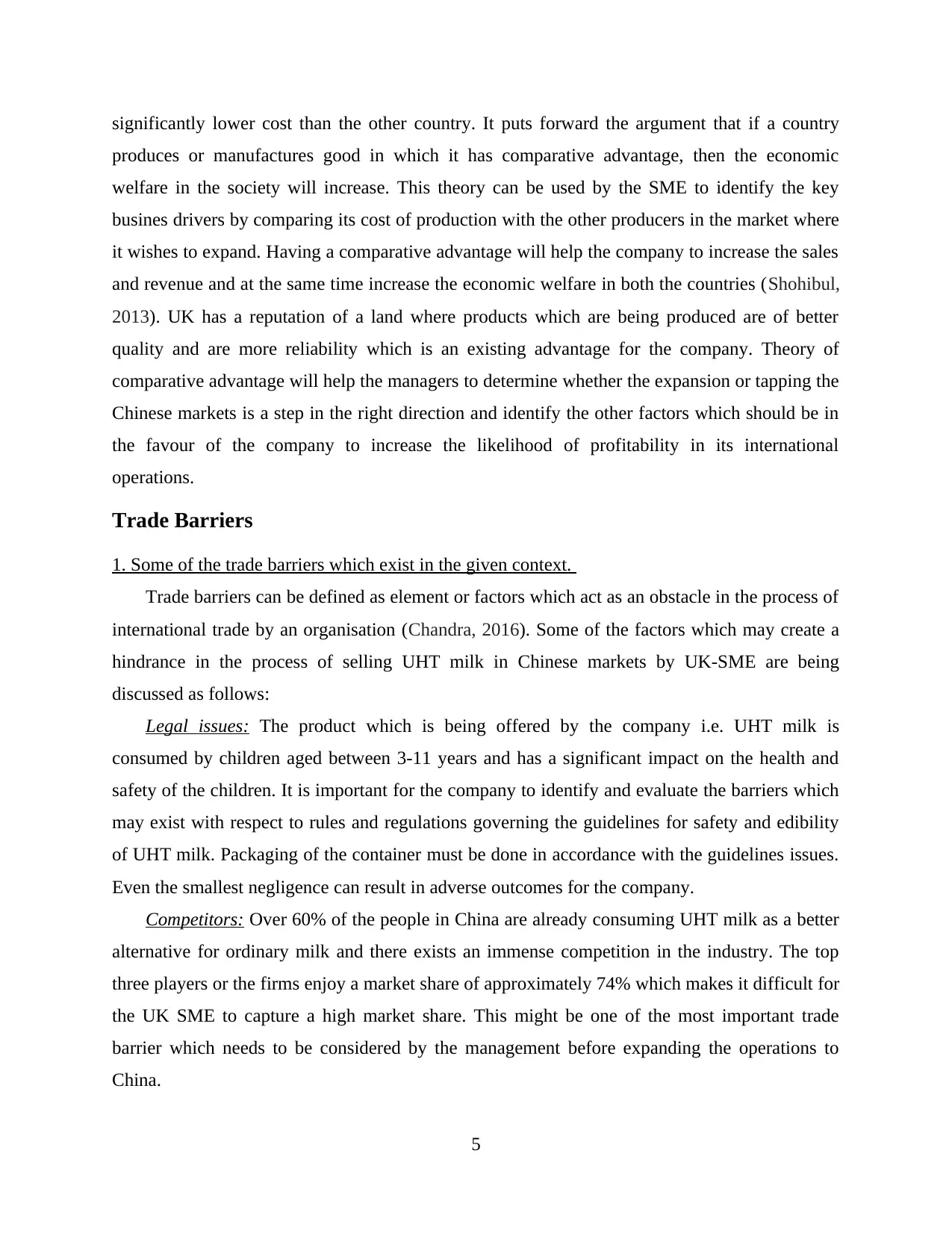
significantly lower cost than the other country. It puts forward the argument that if a country
produces or manufactures good in which it has comparative advantage, then the economic
welfare in the society will increase. This theory can be used by the SME to identify the key
busines drivers by comparing its cost of production with the other producers in the market where
it wishes to expand. Having a comparative advantage will help the company to increase the sales
and revenue and at the same time increase the economic welfare in both the countries (Shohibul,
2013). UK has a reputation of a land where products which are being produced are of better
quality and are more reliability which is an existing advantage for the company. Theory of
comparative advantage will help the managers to determine whether the expansion or tapping the
Chinese markets is a step in the right direction and identify the other factors which should be in
the favour of the company to increase the likelihood of profitability in its international
operations.
Trade Barriers
1. Some of the trade barriers which exist in the given context.
Trade barriers can be defined as element or factors which act as an obstacle in the process of
international trade by an organisation (Chandra, 2016). Some of the factors which may create a
hindrance in the process of selling UHT milk in Chinese markets by UK-SME are being
discussed as follows:
Legal issues: The product which is being offered by the company i.e. UHT milk is
consumed by children aged between 3-11 years and has a significant impact on the health and
safety of the children. It is important for the company to identify and evaluate the barriers which
may exist with respect to rules and regulations governing the guidelines for safety and edibility
of UHT milk. Packaging of the container must be done in accordance with the guidelines issues.
Even the smallest negligence can result in adverse outcomes for the company.
Competitors: Over 60% of the people in China are already consuming UHT milk as a better
alternative for ordinary milk and there exists an immense competition in the industry. The top
three players or the firms enjoy a market share of approximately 74% which makes it difficult for
the UK SME to capture a high market share. This might be one of the most important trade
barrier which needs to be considered by the management before expanding the operations to
China.
5
produces or manufactures good in which it has comparative advantage, then the economic
welfare in the society will increase. This theory can be used by the SME to identify the key
busines drivers by comparing its cost of production with the other producers in the market where
it wishes to expand. Having a comparative advantage will help the company to increase the sales
and revenue and at the same time increase the economic welfare in both the countries (Shohibul,
2013). UK has a reputation of a land where products which are being produced are of better
quality and are more reliability which is an existing advantage for the company. Theory of
comparative advantage will help the managers to determine whether the expansion or tapping the
Chinese markets is a step in the right direction and identify the other factors which should be in
the favour of the company to increase the likelihood of profitability in its international
operations.
Trade Barriers
1. Some of the trade barriers which exist in the given context.
Trade barriers can be defined as element or factors which act as an obstacle in the process of
international trade by an organisation (Chandra, 2016). Some of the factors which may create a
hindrance in the process of selling UHT milk in Chinese markets by UK-SME are being
discussed as follows:
Legal issues: The product which is being offered by the company i.e. UHT milk is
consumed by children aged between 3-11 years and has a significant impact on the health and
safety of the children. It is important for the company to identify and evaluate the barriers which
may exist with respect to rules and regulations governing the guidelines for safety and edibility
of UHT milk. Packaging of the container must be done in accordance with the guidelines issues.
Even the smallest negligence can result in adverse outcomes for the company.
Competitors: Over 60% of the people in China are already consuming UHT milk as a better
alternative for ordinary milk and there exists an immense competition in the industry. The top
three players or the firms enjoy a market share of approximately 74% which makes it difficult for
the UK SME to capture a high market share. This might be one of the most important trade
barrier which needs to be considered by the management before expanding the operations to
China.
5
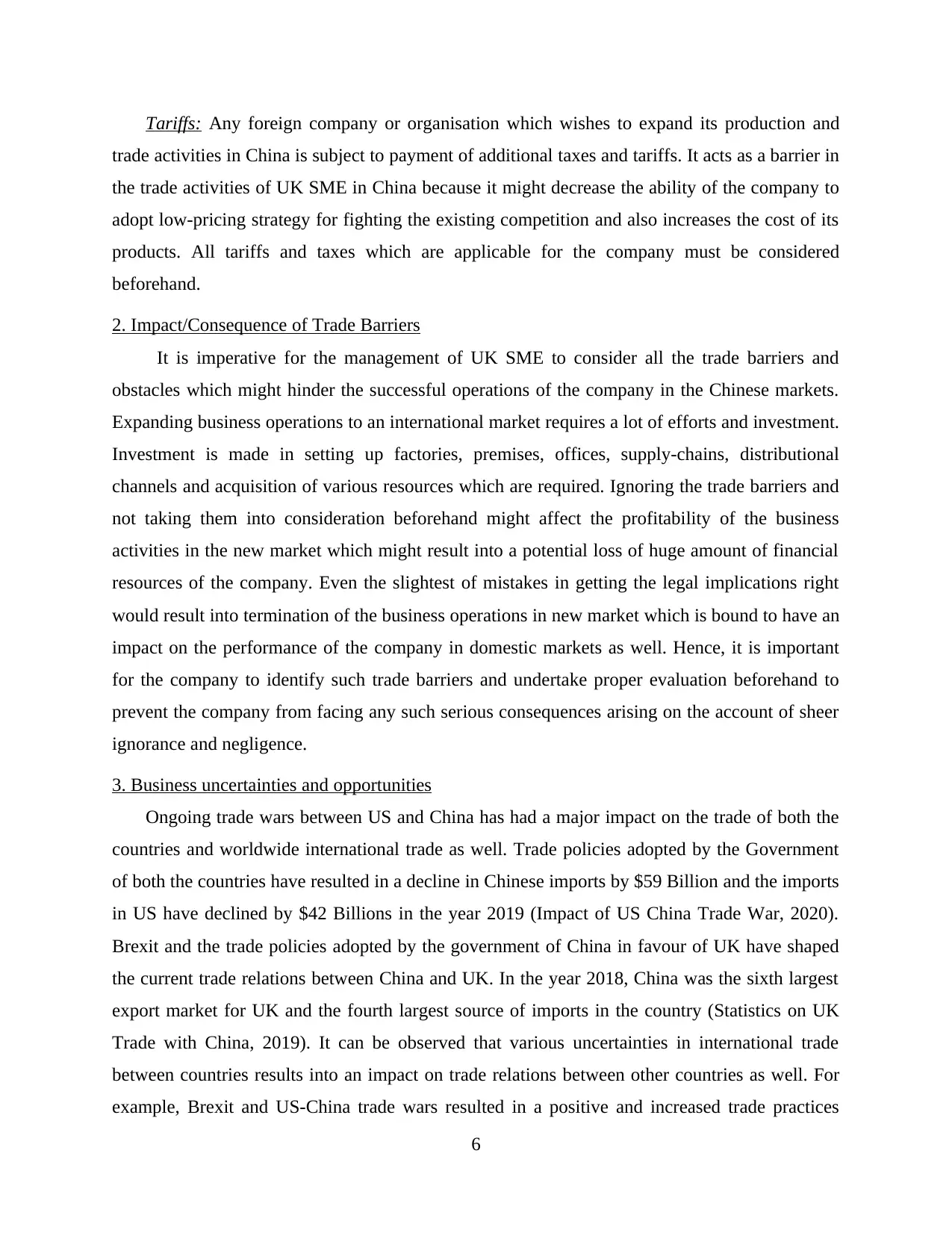
Tariffs: Any foreign company or organisation which wishes to expand its production and
trade activities in China is subject to payment of additional taxes and tariffs. It acts as a barrier in
the trade activities of UK SME in China because it might decrease the ability of the company to
adopt low-pricing strategy for fighting the existing competition and also increases the cost of its
products. All tariffs and taxes which are applicable for the company must be considered
beforehand.
2. Impact/Consequence of Trade Barriers
It is imperative for the management of UK SME to consider all the trade barriers and
obstacles which might hinder the successful operations of the company in the Chinese markets.
Expanding business operations to an international market requires a lot of efforts and investment.
Investment is made in setting up factories, premises, offices, supply-chains, distributional
channels and acquisition of various resources which are required. Ignoring the trade barriers and
not taking them into consideration beforehand might affect the profitability of the business
activities in the new market which might result into a potential loss of huge amount of financial
resources of the company. Even the slightest of mistakes in getting the legal implications right
would result into termination of the business operations in new market which is bound to have an
impact on the performance of the company in domestic markets as well. Hence, it is important
for the company to identify such trade barriers and undertake proper evaluation beforehand to
prevent the company from facing any such serious consequences arising on the account of sheer
ignorance and negligence.
3. Business uncertainties and opportunities
Ongoing trade wars between US and China has had a major impact on the trade of both the
countries and worldwide international trade as well. Trade policies adopted by the Government
of both the countries have resulted in a decline in Chinese imports by $59 Billion and the imports
in US have declined by $42 Billions in the year 2019 (Impact of US China Trade War, 2020).
Brexit and the trade policies adopted by the government of China in favour of UK have shaped
the current trade relations between China and UK. In the year 2018, China was the sixth largest
export market for UK and the fourth largest source of imports in the country (Statistics on UK
Trade with China, 2019). It can be observed that various uncertainties in international trade
between countries results into an impact on trade relations between other countries as well. For
example, Brexit and US-China trade wars resulted in a positive and increased trade practices
6
trade activities in China is subject to payment of additional taxes and tariffs. It acts as a barrier in
the trade activities of UK SME in China because it might decrease the ability of the company to
adopt low-pricing strategy for fighting the existing competition and also increases the cost of its
products. All tariffs and taxes which are applicable for the company must be considered
beforehand.
2. Impact/Consequence of Trade Barriers
It is imperative for the management of UK SME to consider all the trade barriers and
obstacles which might hinder the successful operations of the company in the Chinese markets.
Expanding business operations to an international market requires a lot of efforts and investment.
Investment is made in setting up factories, premises, offices, supply-chains, distributional
channels and acquisition of various resources which are required. Ignoring the trade barriers and
not taking them into consideration beforehand might affect the profitability of the business
activities in the new market which might result into a potential loss of huge amount of financial
resources of the company. Even the slightest of mistakes in getting the legal implications right
would result into termination of the business operations in new market which is bound to have an
impact on the performance of the company in domestic markets as well. Hence, it is important
for the company to identify such trade barriers and undertake proper evaluation beforehand to
prevent the company from facing any such serious consequences arising on the account of sheer
ignorance and negligence.
3. Business uncertainties and opportunities
Ongoing trade wars between US and China has had a major impact on the trade of both the
countries and worldwide international trade as well. Trade policies adopted by the Government
of both the countries have resulted in a decline in Chinese imports by $59 Billion and the imports
in US have declined by $42 Billions in the year 2019 (Impact of US China Trade War, 2020).
Brexit and the trade policies adopted by the government of China in favour of UK have shaped
the current trade relations between China and UK. In the year 2018, China was the sixth largest
export market for UK and the fourth largest source of imports in the country (Statistics on UK
Trade with China, 2019). It can be observed that various uncertainties in international trade
between countries results into an impact on trade relations between other countries as well. For
example, Brexit and US-China trade wars resulted in a positive and increased trade practices
6
Secure Best Marks with AI Grader
Need help grading? Try our AI Grader for instant feedback on your assignments.
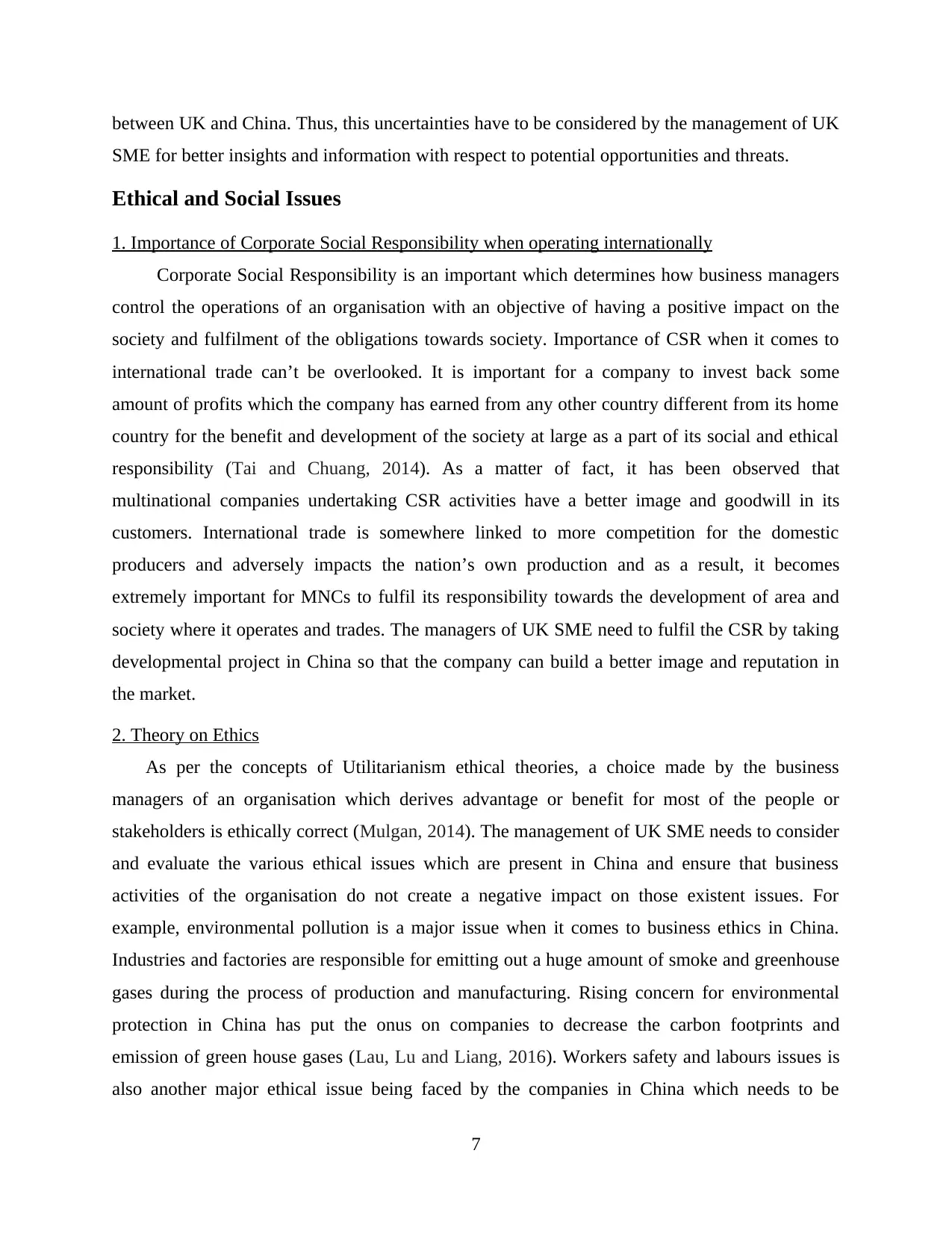
between UK and China. Thus, this uncertainties have to be considered by the management of UK
SME for better insights and information with respect to potential opportunities and threats.
Ethical and Social Issues
1. Importance of Corporate Social Responsibility when operating internationally
Corporate Social Responsibility is an important which determines how business managers
control the operations of an organisation with an objective of having a positive impact on the
society and fulfilment of the obligations towards society. Importance of CSR when it comes to
international trade can’t be overlooked. It is important for a company to invest back some
amount of profits which the company has earned from any other country different from its home
country for the benefit and development of the society at large as a part of its social and ethical
responsibility (Tai and Chuang, 2014). As a matter of fact, it has been observed that
multinational companies undertaking CSR activities have a better image and goodwill in its
customers. International trade is somewhere linked to more competition for the domestic
producers and adversely impacts the nation’s own production and as a result, it becomes
extremely important for MNCs to fulfil its responsibility towards the development of area and
society where it operates and trades. The managers of UK SME need to fulfil the CSR by taking
developmental project in China so that the company can build a better image and reputation in
the market.
2. Theory on Ethics
As per the concepts of Utilitarianism ethical theories, a choice made by the business
managers of an organisation which derives advantage or benefit for most of the people or
stakeholders is ethically correct (Mulgan, 2014). The management of UK SME needs to consider
and evaluate the various ethical issues which are present in China and ensure that business
activities of the organisation do not create a negative impact on those existent issues. For
example, environmental pollution is a major issue when it comes to business ethics in China.
Industries and factories are responsible for emitting out a huge amount of smoke and greenhouse
gases during the process of production and manufacturing. Rising concern for environmental
protection in China has put the onus on companies to decrease the carbon footprints and
emission of green house gases (Lau, Lu and Liang, 2016). Workers safety and labours issues is
also another major ethical issue being faced by the companies in China which needs to be
7
SME for better insights and information with respect to potential opportunities and threats.
Ethical and Social Issues
1. Importance of Corporate Social Responsibility when operating internationally
Corporate Social Responsibility is an important which determines how business managers
control the operations of an organisation with an objective of having a positive impact on the
society and fulfilment of the obligations towards society. Importance of CSR when it comes to
international trade can’t be overlooked. It is important for a company to invest back some
amount of profits which the company has earned from any other country different from its home
country for the benefit and development of the society at large as a part of its social and ethical
responsibility (Tai and Chuang, 2014). As a matter of fact, it has been observed that
multinational companies undertaking CSR activities have a better image and goodwill in its
customers. International trade is somewhere linked to more competition for the domestic
producers and adversely impacts the nation’s own production and as a result, it becomes
extremely important for MNCs to fulfil its responsibility towards the development of area and
society where it operates and trades. The managers of UK SME need to fulfil the CSR by taking
developmental project in China so that the company can build a better image and reputation in
the market.
2. Theory on Ethics
As per the concepts of Utilitarianism ethical theories, a choice made by the business
managers of an organisation which derives advantage or benefit for most of the people or
stakeholders is ethically correct (Mulgan, 2014). The management of UK SME needs to consider
and evaluate the various ethical issues which are present in China and ensure that business
activities of the organisation do not create a negative impact on those existent issues. For
example, environmental pollution is a major issue when it comes to business ethics in China.
Industries and factories are responsible for emitting out a huge amount of smoke and greenhouse
gases during the process of production and manufacturing. Rising concern for environmental
protection in China has put the onus on companies to decrease the carbon footprints and
emission of green house gases (Lau, Lu and Liang, 2016). Workers safety and labours issues is
also another major ethical issue being faced by the companies in China which needs to be
7
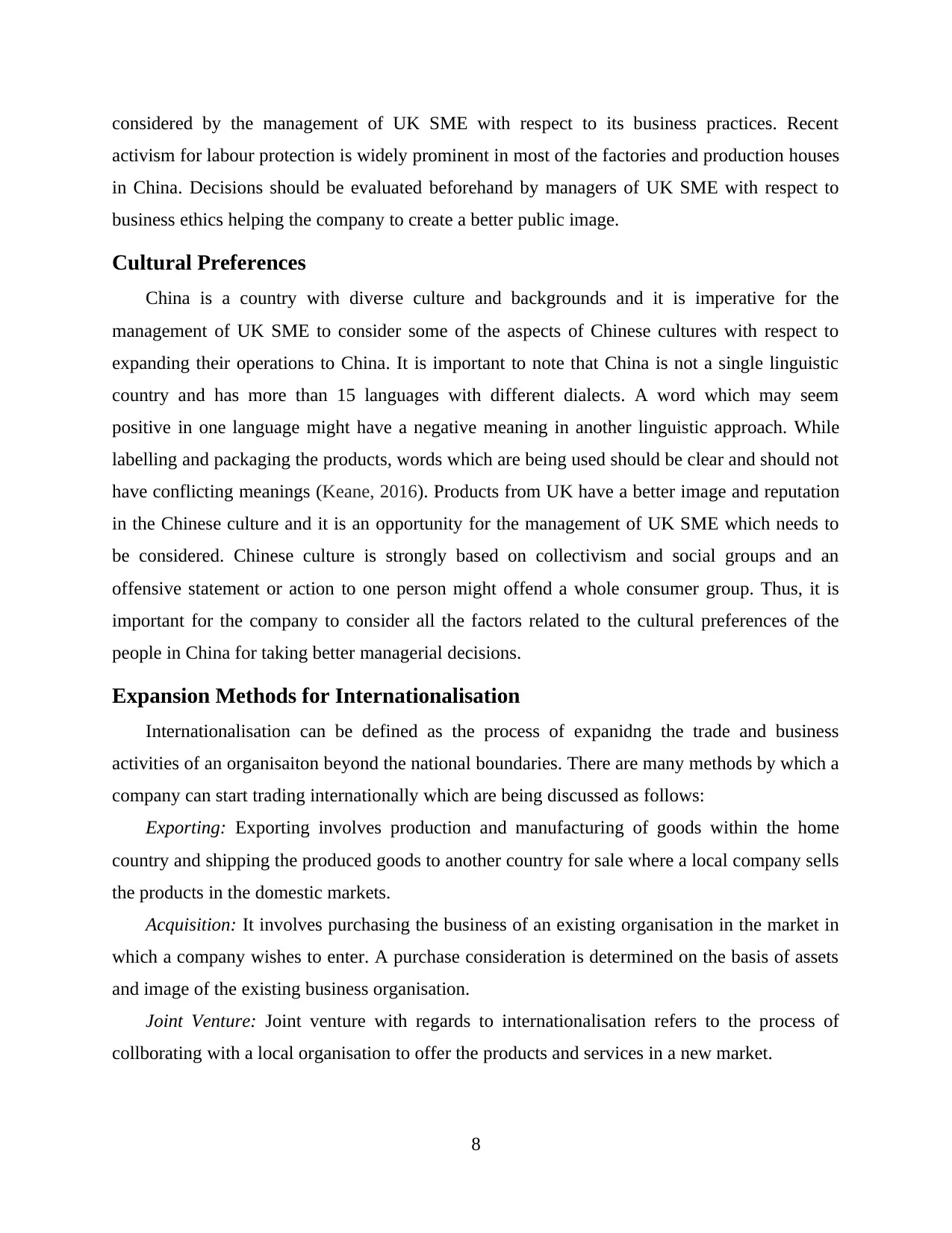
considered by the management of UK SME with respect to its business practices. Recent
activism for labour protection is widely prominent in most of the factories and production houses
in China. Decisions should be evaluated beforehand by managers of UK SME with respect to
business ethics helping the company to create a better public image.
Cultural Preferences
China is a country with diverse culture and backgrounds and it is imperative for the
management of UK SME to consider some of the aspects of Chinese cultures with respect to
expanding their operations to China. It is important to note that China is not a single linguistic
country and has more than 15 languages with different dialects. A word which may seem
positive in one language might have a negative meaning in another linguistic approach. While
labelling and packaging the products, words which are being used should be clear and should not
have conflicting meanings (Keane, 2016). Products from UK have a better image and reputation
in the Chinese culture and it is an opportunity for the management of UK SME which needs to
be considered. Chinese culture is strongly based on collectivism and social groups and an
offensive statement or action to one person might offend a whole consumer group. Thus, it is
important for the company to consider all the factors related to the cultural preferences of the
people in China for taking better managerial decisions.
Expansion Methods for Internationalisation
Internationalisation can be defined as the process of expanidng the trade and business
activities of an organisaiton beyond the national boundaries. There are many methods by which a
company can start trading internationally which are being discussed as follows:
Exporting: Exporting involves production and manufacturing of goods within the home
country and shipping the produced goods to another country for sale where a local company sells
the products in the domestic markets.
Acquisition: It involves purchasing the business of an existing organisation in the market in
which a company wishes to enter. A purchase consideration is determined on the basis of assets
and image of the existing business organisation.
Joint Venture: Joint venture with regards to internationalisation refers to the process of
collborating with a local organisation to offer the products and services in a new market.
8
activism for labour protection is widely prominent in most of the factories and production houses
in China. Decisions should be evaluated beforehand by managers of UK SME with respect to
business ethics helping the company to create a better public image.
Cultural Preferences
China is a country with diverse culture and backgrounds and it is imperative for the
management of UK SME to consider some of the aspects of Chinese cultures with respect to
expanding their operations to China. It is important to note that China is not a single linguistic
country and has more than 15 languages with different dialects. A word which may seem
positive in one language might have a negative meaning in another linguistic approach. While
labelling and packaging the products, words which are being used should be clear and should not
have conflicting meanings (Keane, 2016). Products from UK have a better image and reputation
in the Chinese culture and it is an opportunity for the management of UK SME which needs to
be considered. Chinese culture is strongly based on collectivism and social groups and an
offensive statement or action to one person might offend a whole consumer group. Thus, it is
important for the company to consider all the factors related to the cultural preferences of the
people in China for taking better managerial decisions.
Expansion Methods for Internationalisation
Internationalisation can be defined as the process of expanidng the trade and business
activities of an organisaiton beyond the national boundaries. There are many methods by which a
company can start trading internationally which are being discussed as follows:
Exporting: Exporting involves production and manufacturing of goods within the home
country and shipping the produced goods to another country for sale where a local company sells
the products in the domestic markets.
Acquisition: It involves purchasing the business of an existing organisation in the market in
which a company wishes to enter. A purchase consideration is determined on the basis of assets
and image of the existing business organisation.
Joint Venture: Joint venture with regards to internationalisation refers to the process of
collborating with a local organisation to offer the products and services in a new market.
8
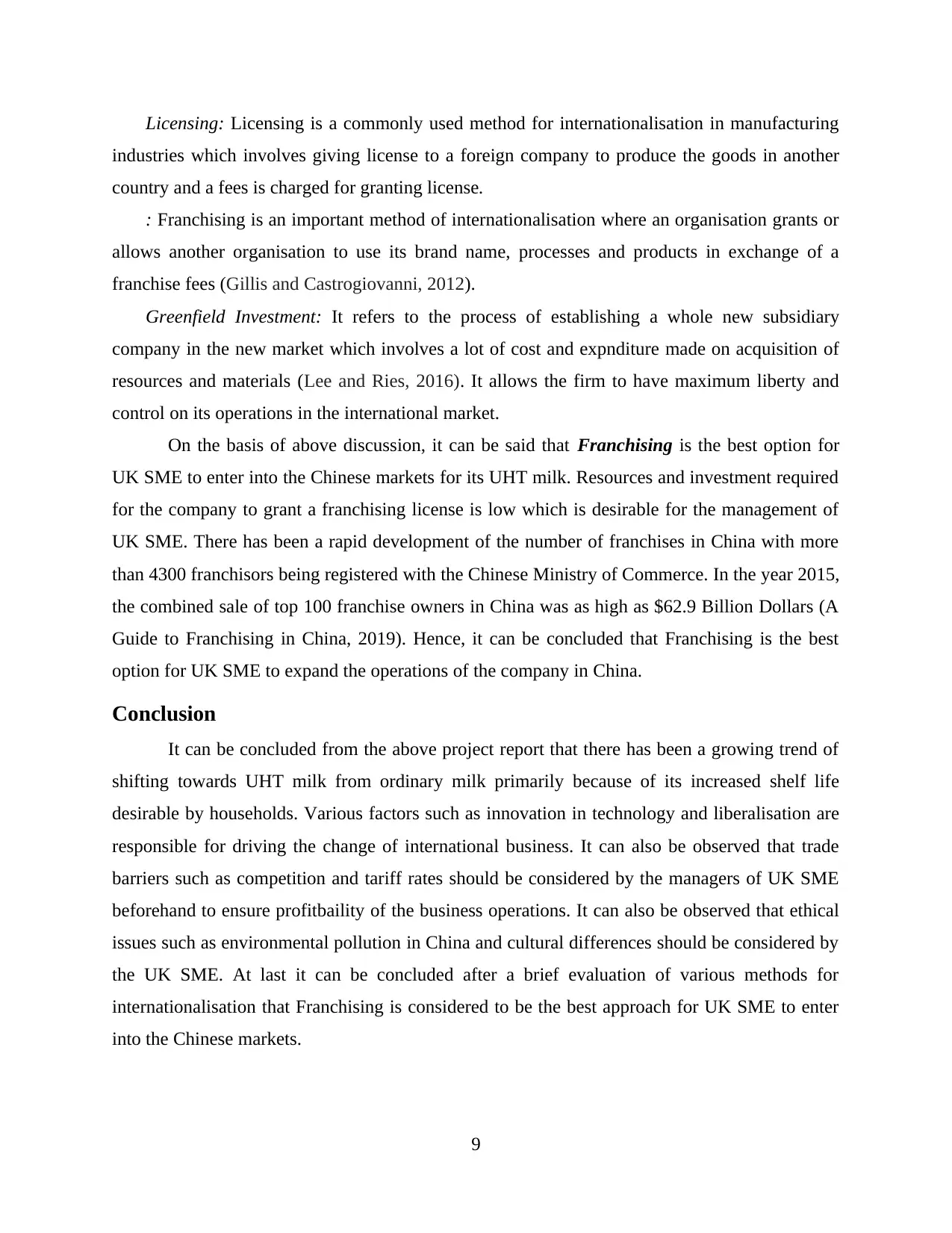
Licensing: Licensing is a commonly used method for internationalisation in manufacturing
industries which involves giving license to a foreign company to produce the goods in another
country and a fees is charged for granting license.
: Franchising is an important method of internationalisation where an organisation grants or
allows another organisation to use its brand name, processes and products in exchange of a
franchise fees (Gillis and Castrogiovanni, 2012).
Greenfield Investment: It refers to the process of establishing a whole new subsidiary
company in the new market which involves a lot of cost and expnditure made on acquisition of
resources and materials (Lee and Ries, 2016). It allows the firm to have maximum liberty and
control on its operations in the international market.
On the basis of above discussion, it can be said that Franchising is the best option for
UK SME to enter into the Chinese markets for its UHT milk. Resources and investment required
for the company to grant a franchising license is low which is desirable for the management of
UK SME. There has been a rapid development of the number of franchises in China with more
than 4300 franchisors being registered with the Chinese Ministry of Commerce. In the year 2015,
the combined sale of top 100 franchise owners in China was as high as $62.9 Billion Dollars (A
Guide to Franchising in China, 2019). Hence, it can be concluded that Franchising is the best
option for UK SME to expand the operations of the company in China.
Conclusion
It can be concluded from the above project report that there has been a growing trend of
shifting towards UHT milk from ordinary milk primarily because of its increased shelf life
desirable by households. Various factors such as innovation in technology and liberalisation are
responsible for driving the change of international business. It can also be observed that trade
barriers such as competition and tariff rates should be considered by the managers of UK SME
beforehand to ensure profitbaility of the business operations. It can also be observed that ethical
issues such as environmental pollution in China and cultural differences should be considered by
the UK SME. At last it can be concluded after a brief evaluation of various methods for
internationalisation that Franchising is considered to be the best approach for UK SME to enter
into the Chinese markets.
9
industries which involves giving license to a foreign company to produce the goods in another
country and a fees is charged for granting license.
: Franchising is an important method of internationalisation where an organisation grants or
allows another organisation to use its brand name, processes and products in exchange of a
franchise fees (Gillis and Castrogiovanni, 2012).
Greenfield Investment: It refers to the process of establishing a whole new subsidiary
company in the new market which involves a lot of cost and expnditure made on acquisition of
resources and materials (Lee and Ries, 2016). It allows the firm to have maximum liberty and
control on its operations in the international market.
On the basis of above discussion, it can be said that Franchising is the best option for
UK SME to enter into the Chinese markets for its UHT milk. Resources and investment required
for the company to grant a franchising license is low which is desirable for the management of
UK SME. There has been a rapid development of the number of franchises in China with more
than 4300 franchisors being registered with the Chinese Ministry of Commerce. In the year 2015,
the combined sale of top 100 franchise owners in China was as high as $62.9 Billion Dollars (A
Guide to Franchising in China, 2019). Hence, it can be concluded that Franchising is the best
option for UK SME to expand the operations of the company in China.
Conclusion
It can be concluded from the above project report that there has been a growing trend of
shifting towards UHT milk from ordinary milk primarily because of its increased shelf life
desirable by households. Various factors such as innovation in technology and liberalisation are
responsible for driving the change of international business. It can also be observed that trade
barriers such as competition and tariff rates should be considered by the managers of UK SME
beforehand to ensure profitbaility of the business operations. It can also be observed that ethical
issues such as environmental pollution in China and cultural differences should be considered by
the UK SME. At last it can be concluded after a brief evaluation of various methods for
internationalisation that Franchising is considered to be the best approach for UK SME to enter
into the Chinese markets.
9
Paraphrase This Document
Need a fresh take? Get an instant paraphrase of this document with our AI Paraphraser
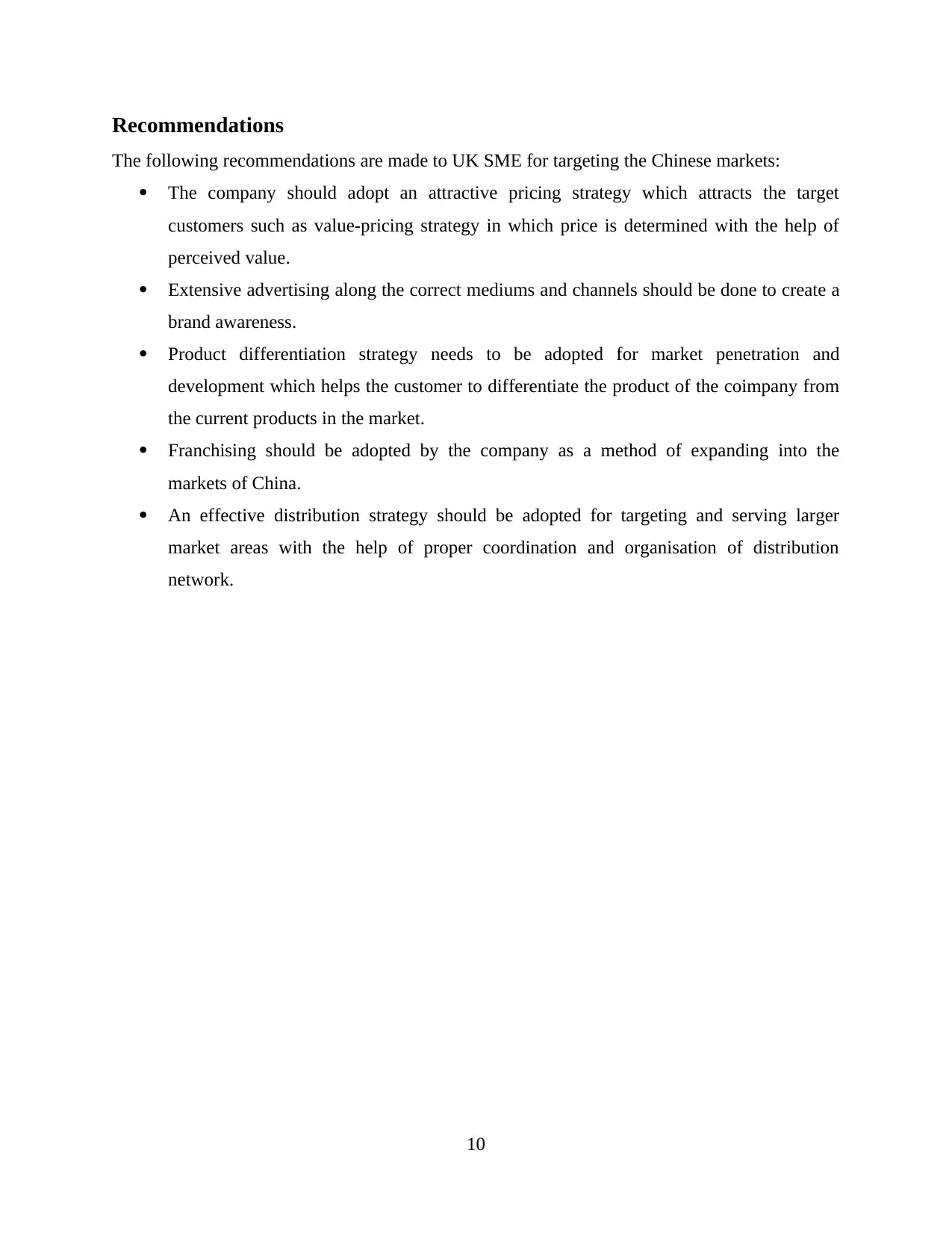
Recommendations
The following recommendations are made to UK SME for targeting the Chinese markets:
The company should adopt an attractive pricing strategy which attracts the target
customers such as value-pricing strategy in which price is determined with the help of
perceived value.
Extensive advertising along the correct mediums and channels should be done to create a
brand awareness.
Product differentiation strategy needs to be adopted for market penetration and
development which helps the customer to differentiate the product of the coimpany from
the current products in the market.
Franchising should be adopted by the company as a method of expanding into the
markets of China.
An effective distribution strategy should be adopted for targeting and serving larger
market areas with the help of proper coordination and organisation of distribution
network.
10
The following recommendations are made to UK SME for targeting the Chinese markets:
The company should adopt an attractive pricing strategy which attracts the target
customers such as value-pricing strategy in which price is determined with the help of
perceived value.
Extensive advertising along the correct mediums and channels should be done to create a
brand awareness.
Product differentiation strategy needs to be adopted for market penetration and
development which helps the customer to differentiate the product of the coimpany from
the current products in the market.
Franchising should be adopted by the company as a method of expanding into the
markets of China.
An effective distribution strategy should be adopted for targeting and serving larger
market areas with the help of proper coordination and organisation of distribution
network.
10
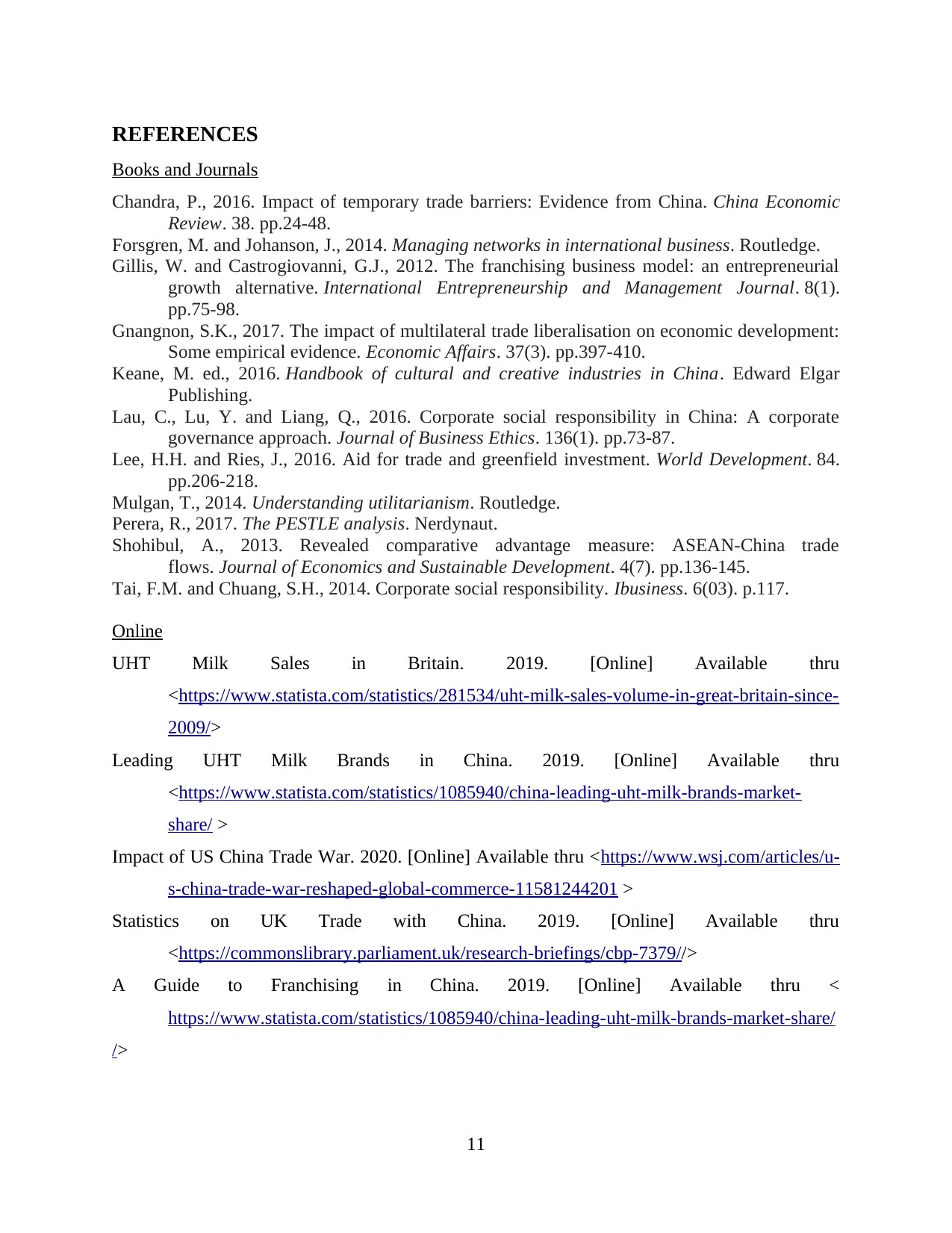
REFERENCES
Books and Journals
Chandra, P., 2016. Impact of temporary trade barriers: Evidence from China. China Economic
Review. 38. pp.24-48.
Forsgren, M. and Johanson, J., 2014. Managing networks in international business. Routledge.
Gillis, W. and Castrogiovanni, G.J., 2012. The franchising business model: an entrepreneurial
growth alternative. International Entrepreneurship and Management Journal. 8(1).
pp.75-98.
Gnangnon, S.K., 2017. The impact of multilateral trade liberalisation on economic development:
Some empirical evidence. Economic Affairs. 37(3). pp.397-410.
Keane, M. ed., 2016. Handbook of cultural and creative industries in China. Edward Elgar
Publishing.
Lau, C., Lu, Y. and Liang, Q., 2016. Corporate social responsibility in China: A corporate
governance approach. Journal of Business Ethics. 136(1). pp.73-87.
Lee, H.H. and Ries, J., 2016. Aid for trade and greenfield investment. World Development. 84.
pp.206-218.
Mulgan, T., 2014. Understanding utilitarianism. Routledge.
Perera, R., 2017. The PESTLE analysis. Nerdynaut.
Shohibul, A., 2013. Revealed comparative advantage measure: ASEAN-China trade
flows. Journal of Economics and Sustainable Development. 4(7). pp.136-145.
Tai, F.M. and Chuang, S.H., 2014. Corporate social responsibility. Ibusiness. 6(03). p.117.
Online
UHT Milk Sales in Britain. 2019. [Online] Available thru
<https://www.statista.com/statistics/281534/uht-milk-sales-volume-in-great-britain-since-
2009/>
Leading UHT Milk Brands in China. 2019. [Online] Available thru
<https://www.statista.com/statistics/1085940/china-leading-uht-milk-brands-market-
share/ >
Impact of US China Trade War. 2020. [Online] Available thru <https://www.wsj.com/articles/u-
s-china-trade-war-reshaped-global-commerce-11581244201 >
Statistics on UK Trade with China. 2019. [Online] Available thru
<https://commonslibrary.parliament.uk/research-briefings/cbp-7379//>
A Guide to Franchising in China. 2019. [Online] Available thru <
https://www.statista.com/statistics/1085940/china-leading-uht-milk-brands-market-share/
/>
11
Books and Journals
Chandra, P., 2016. Impact of temporary trade barriers: Evidence from China. China Economic
Review. 38. pp.24-48.
Forsgren, M. and Johanson, J., 2014. Managing networks in international business. Routledge.
Gillis, W. and Castrogiovanni, G.J., 2012. The franchising business model: an entrepreneurial
growth alternative. International Entrepreneurship and Management Journal. 8(1).
pp.75-98.
Gnangnon, S.K., 2017. The impact of multilateral trade liberalisation on economic development:
Some empirical evidence. Economic Affairs. 37(3). pp.397-410.
Keane, M. ed., 2016. Handbook of cultural and creative industries in China. Edward Elgar
Publishing.
Lau, C., Lu, Y. and Liang, Q., 2016. Corporate social responsibility in China: A corporate
governance approach. Journal of Business Ethics. 136(1). pp.73-87.
Lee, H.H. and Ries, J., 2016. Aid for trade and greenfield investment. World Development. 84.
pp.206-218.
Mulgan, T., 2014. Understanding utilitarianism. Routledge.
Perera, R., 2017. The PESTLE analysis. Nerdynaut.
Shohibul, A., 2013. Revealed comparative advantage measure: ASEAN-China trade
flows. Journal of Economics and Sustainable Development. 4(7). pp.136-145.
Tai, F.M. and Chuang, S.H., 2014. Corporate social responsibility. Ibusiness. 6(03). p.117.
Online
UHT Milk Sales in Britain. 2019. [Online] Available thru
<https://www.statista.com/statistics/281534/uht-milk-sales-volume-in-great-britain-since-
2009/>
Leading UHT Milk Brands in China. 2019. [Online] Available thru
<https://www.statista.com/statistics/1085940/china-leading-uht-milk-brands-market-
share/ >
Impact of US China Trade War. 2020. [Online] Available thru <https://www.wsj.com/articles/u-
s-china-trade-war-reshaped-global-commerce-11581244201 >
Statistics on UK Trade with China. 2019. [Online] Available thru
<https://commonslibrary.parliament.uk/research-briefings/cbp-7379//>
A Guide to Franchising in China. 2019. [Online] Available thru <
https://www.statista.com/statistics/1085940/china-leading-uht-milk-brands-market-share/
/>
11

12
1 out of 16
Related Documents
Your All-in-One AI-Powered Toolkit for Academic Success.
+13062052269
info@desklib.com
Available 24*7 on WhatsApp / Email
![[object Object]](/_next/static/media/star-bottom.7253800d.svg)
Unlock your academic potential
© 2024 | Zucol Services PVT LTD | All rights reserved.





